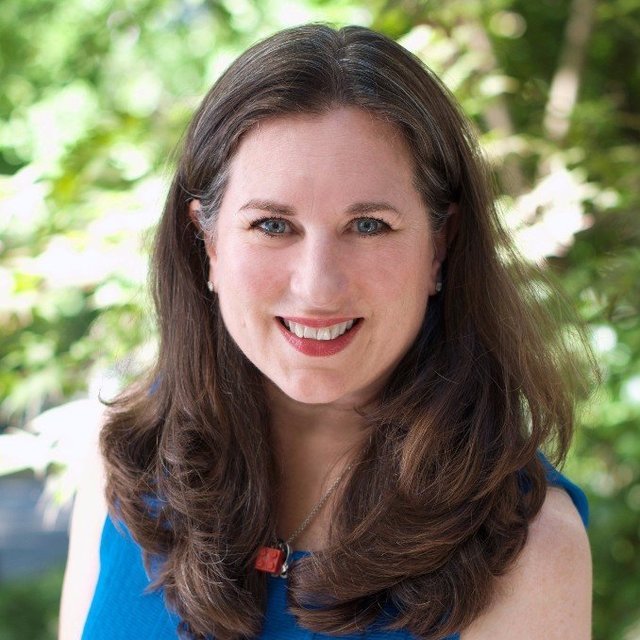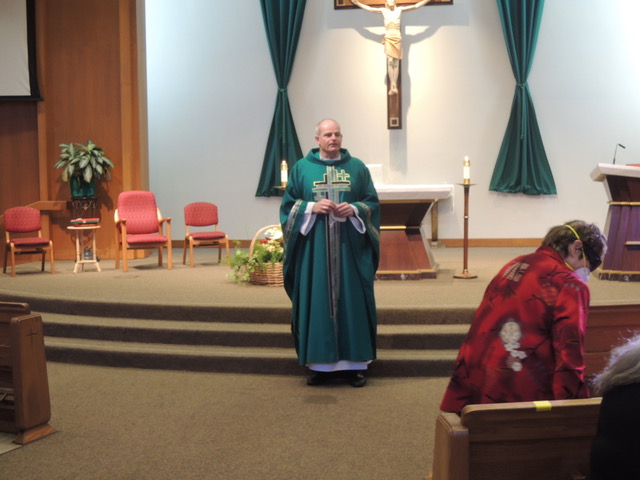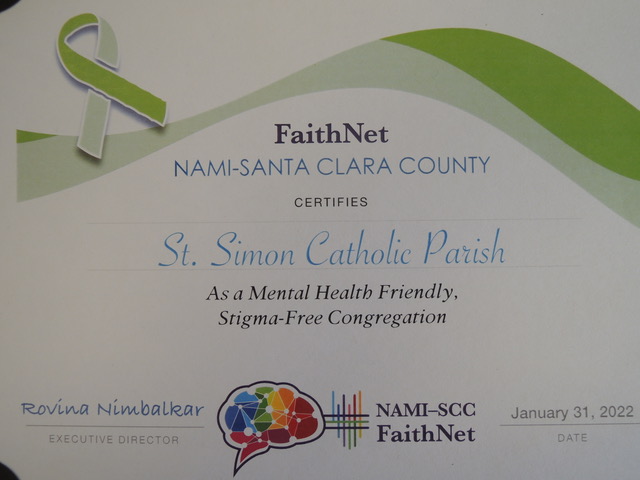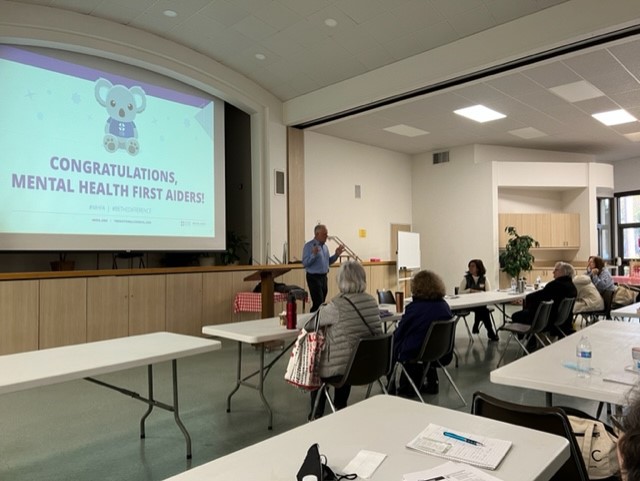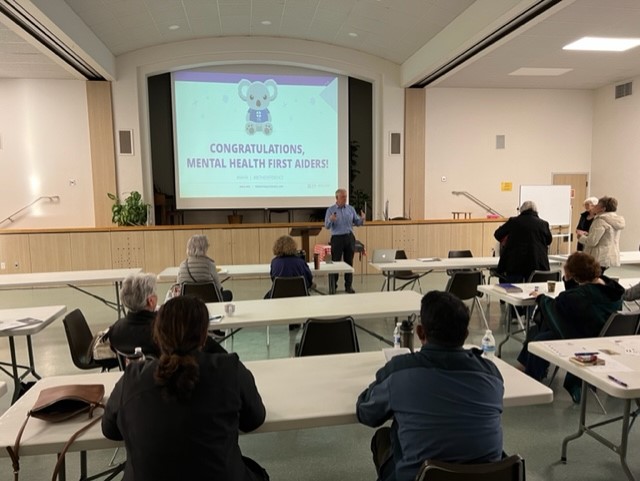Articles & Reflections
Article 06
Mental health ministry a dire need across the U.S.
By Kimberley Heatherington | January 19, 2023
Article 05
Out of The Wilderness
By Barbara F. Zahner | May 2022
Out of the Wilderness
Prophetic Minister for Those With Mental Illness
Standing ovations rarely occur at Sunday Lenten liturgies, especially Sunday Masses at 8:30 a.m. Yet, on Sunday, March 13, 2022, Father George Aranha, pastor of Santa Teresa Church in South San Jose, ended the liturgy announcing the return of Rich Berryessa.
A member of Santa Teresa Church since 1976 and founder of the Mental Health Ministry in the Diocese of San José, Rich’s generosity of spirit has touched many. With a broad smile, Fr. George gestured, “You can see Rich over there in the right-hand corner. Welcome back, Rich!” Necks craned, fingers pointed, smiles enveloped the relieved faces of Rich’s many friends in Santa Teresa Parish. The final gong of the Lenten bell sounded. Instead of heading home for Sunday breakfast, churchgoers surrounded Richard Berryessa.
Article 04
Peace | Give You
Sixth Sunday of Easter May 22, 2022
By Fr. Brendan McGuire, Pastor, St. Simon Parish, Los Altos, CA
Peace I Give you
 “My peace I give to you.
“My peace I give to you.
My peace I leave with you.”
Over the last couple of days,
our new mental health ministry team called “Hope and Wellness”
along with couple of staff members and myself attended
the National Mental Health Professionals Catholic Association
here in Los Altos on retreat.
It has been amazing to hear these speakers
talking from the heart about how we can be more attentive
to the needs of those who are suffering from mental illness.
It was so powerful.
There were many lessons one could take from these days
that I’m still unpacking the content.
One of the things they brought up is
how important it is to not name the persons by their illness
but rather that they have an illness.
They are more than their illness;
they are to be treated as persons.
For instance: A person is not a schizophrenic.
He is suffering from schizophrenia.
She is not a bipolar.
She is suffering from bipolar disease.
It seems like a very small thing
but we are more than our diseases.
We are more than our wounds and our brokenness.
We have a soul.
And part of it is that when we treat people as persons
who have an illness as opposed to the person being the illness,
it makes all the difference in the world.
This is very clear among medical professionals
that when you go to a hospital:
you are treated for your disease versus being a person who has a disease
whether it be a physical illness or a mental illness.
It is really the same with a physical illness.
One of the things they were trying to help us understand
is how these episodes of mental illness
can come about and how trauma plays a role in it
and how so many of us are well equipped to cope
with these stressful situations and traumas.
While many of us manage them quite well,
there are a significant number of people,
who are ill equipped to deal with these episodes;
these stressors; or these extra traumas that happen to all of us.
Because they are ill equipped to deal with these episodes,
whether it be by genetic conditioning if you would;
or whether by environmental conditions
or home conditions that have enabled them,
they are often ill equipped or mal equipped.
In other words, they have learned bad habits
that make even the situation then more stressful
not only for them but for all those around them.
It was powerful and again as I say, I am still unpacking it.
One of the core areas that they also spoke of was
how important it is that when we reach out to somebody
who is having a mental health episode,
that we treat them as a person and
that we are not trying to cure them but care for them;
that we are not trying to heal them
but we are trying to companion with them
so they don’t further isolate
but that they come into community,
which can make a complex situation even worse.
When I was reflecting on today’s scripture, I was thinking;
Isn’t that what we are called to do for all as a disciple?
What are we called to do for each other?
As a disciple to not see each other as the wounds that we have;
or the brokenness that we have;
that we are called to see each other as individuals,
as persons, as souls, yes with wounds and with brokenness.
Jesus, over and over again, does this; he goes to the wounded and broken;
he examples this and says tend to them as human beings first,
as souls with struggles.
He goes out and meets them.
He commands his disciples saying, “Love one another.”
This is the critical component:
Loving is the way to peace.
We all want peace.
When I say “peace” we are not talking about “not war.”
We are talking about an inner peace, a centeredness.
A calmness that comes from within our spirit
and that can only come when we ourselves are
calm and centered in our own soul
Then we can be centered and
be able to companion others in their souls to this peace.
What does that require of us?
It requires of us, as you have heard me say 1,000 times
and I will continue to say it:
We have to be men and women of prayer
so we can center ourselves;
that we know our own soul;
and that we know our own weakness;
our own brokenness; our own tendencies
maybe to not be able to handle our own stress sometimes.
Out of that centeredness in Christ’s love and Christ’s peace
we are in a position then to offer that gentleness,
that care, not cure to others;
that we are willing to be present to them
so that we can deescalate a situation
whether it be a mental health challenge for somebody;
or whether it be just a regular stressful situation in our own life.
We have committed as a parish to be
a Mental Illness stigma-free environment
so that we can minister to one another;
that we can be honest; that we all have struggles.
But we need to do that not only
for people struggling with mental illness
but do that for everyone.
As the song says “All are welcome.”
And that we are called to care for one another;
that we are called to love one another where we are at;
and the only way we can do that is if we are centered on Christ.
That is the only way that I know we can do that.
That is because this is our center.
The center is in Christ and in the Eucharist
and out of there, we get nourished;
we get strengthened; and
then we go forth to do the work of being a disciple,
focusing more on care than cure;
on presence and accompaniment than on trying to change people.
Today, we come to bring peace as Christ has given us peace,
a peace the world cannot give
because this peace is based in love,
the love that God gave to us first and
then we pass on to others.
“My peace I give to you.
My peace I leave with you.”
Mental Health Ministers at St. Simon Parish: Maria Allo, Linda Batton, Rose Lue (Team Lead), Michelle Neallon (staff liaison) Anna Pryor, Linda Ramelot, Dolores Gallagher Thompson and Larry Thompson. Donna Antosiak is in formation as Mental Health Minister at St. Simon Church.
Article 03
Mental Health Continuum CAF Model and Reflection: Peace be With You
Barbara F. Zahner,
3 GEN+ Mental Health Ministry, St. Francis of Assisi Church, San Jose
Mental Health Continuum CAF Model and Reflection: Peace be With You

Mental Health Continuum model graphic from researchgat
Jesus greeted all whom He encountered with “Shlama ‘allāwkhon” which means in Aramaic “peace on you”. We repeat this ancient and meaningful blessing in our Mass during the Gesture of Peace. Once a friend who experiences anxiety and depression (often an emotional loop), noted the spiritual uplift she felt when an acquaintance far across the church singled her out for a heartfelt gesture, “Peace be with you!”
Inner peace—a sign of mental, emotional, and spiritual well-being-often eludes us. Mental Health professionals speak of Mental Health as stretching on a continuum. We all experience days where we feel better than other days. Similar to physical health, we can take steps to improve our mental health. First, what is mental health? The World Health Organization defines Mental Health as, “a state of well-being in which the individual realizes his or her own abilities, can cope with the normal stresses of life, can work productively and fruitfully, and is able to make a contribution to his or her community.”
As the continuum illustrates, Mental Health is not either-or. We can move back and forth across the continuum depending on circumstances. Per a New Zealand mental health website: Where we sit on the continuum at any point in time will shift depending on life experiences, the cumulative level of stress, levels of resilience (natural and learned) and levels of support. ( http://health.nzdf.mil.nz/mind/about-mental-health/the-mental-health-continuum/)
Levels of Support. This is where as a faith community we practice our baptismal call to manifest Christ’s healing light. Recently I felt discouraged. Then I experienced support from members of St. Francis of Assisi Church. Each of these encounters took less than 5 minutes. Each provided me healing support.
Karen Meschke reached out and gently touched my hand and smiled as we realized a mutual mix-up.
Kevin Bernaga jumped up from his desk and said to me, “Sure, I can help,” when a Scripture Study video balked.
Fr. Athanasius Kikoba spotted me sitting alone. He tapped me lightly on the shoulder and asked my name. Then Fr. A. sat down. He asked me about Mental Health Ministry. He listened attentively and offered to meet with me to learn more.
Beth Millares connected with my eyes during the Gesture of Peace at a Tuesday Mass. Afterwards, she affirmed our shared work at Valley Medical Center. Then she added, “I am interested in Mental Health Ministry. Contact me.” What a gift!
During Mental Health Awareness Month, refer to the Mental Health Continuum. Note how you move back and forth on the Continuum. Practice the suggestions to self-regulate. Finally, be a Sign of Peace to each person you encounter. Your small gesture—whether in word, touch, listening presence—brings the Light of Christ to the person before you.
Article 02
“How are you, I’m fine”
by Catherine Campbell
"How are you, I'm fine" by Catherine Campbell
Article 01
News
Commissioning of Mental Health Ministers
Commissioning of Mental Health Ministers at St. Simon | 02-13-2022
MHFA March 5 Training
Deacon Ed Shoener, Founder and President of the Association of Catholic Mental Health Ministers congratulates 20 participants who completed Mental Health First Aid at St. Thomas of Canterbury. The eight-hour class held on March 5 covers signs and symptoms of Mental Health Challenges. The course also offers a five-step process for assisting someone experiencing a mental health crisis. The participants came from St. Francis of Assisi, St. Julie, St. Lucy, St. Simon, St. Thomas of Canterbury, and St. Nicholas-St. William Parishes. Participants evaluated MHFA as useful, engaging, and most needed.

